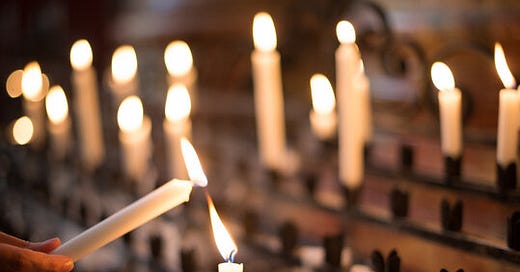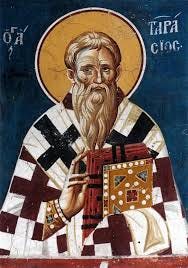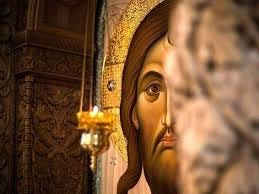“When God wants to have mercy on someone, He inspires someone else to pray for him, and He helps in this prayer.”
St. Silouan the Athonite
Jude 1:1-10
Brethren, being very eager to write to you of our common salvation, I found it necessary to write appealing to you to contend for the faith which was once for all delivered to the saints. For admission has been secretly gained by some who long ago were designated for this condemnation, ungodly persons who pervert the grace of our God into licentiousness and deny our only Master and Lord, Jesus Christ. Now I desire to remind you, though you were once for all fully informed, that he who saved a people out of the land of Egypt, afterward destroyed those who did not believe. And the angels that did not keep their own position but left their proper dwelling have been kept by him in eternal chains in the nether gloom until the judgment of the great day; just as Sodom and Gomor’rah and the surrounding cities, which likewise acted immorally and indulged in unnatural lust, serve as an example by undergoing a punishment of eternal fire. Yet in like manner these men in their dreamings defile the flesh, reject authority, and revile the glorious ones. But when the archangel Michael, contending with the devil, disputed about the body of Moses, he did not presume to pronounce a reviling judgment upon him, but said, “The Lord rebuke you.” But these men revile whatever they do not understand, and by those things that they know by instinct as irrational animals do, they are destroyed.
Luke 22:39-42, 45-23:1
At that time, he came out, and went, as was his custom, to the Mount of Olives; and the disciples followed him. And when he came to the place he said to them, “Pray that you may not enter into temptation.” And he withdrew from them about a stone’s throw, and knelt down and prayed, “Father, if thou art willing, remove this cup from me; nevertheless not my will, but thine, be done.”
And when he rose from prayer, he came to the disciples and found them sleeping for sorrow, and he said to them, “Why do you sleep? Rise and pray that you may not enter into temptation.” While he was still speaking, there came a crowd, and the man called Judas, one of the twelve, was leading them. He drew near to Jesus to kiss him; 48 but Jesus said to him, “Judas, would you betray the Son of man with a kiss?” And when those who were about him saw what would follow, they said, “Lord, shall we strike with the sword?” And one of them struck the slave of the high priest and cut off his right ear. But Jesus said, “No more of this!” And he touched his ear and healed him. Then Jesus said to the chief priests and officers of the temple and elders, who had come out against him, “Have you come out as against a robber, with swords and clubs? When I was with you day after day in the temple, you did not lay hands on me. But this is your hour, and the power of darkness.” Then they seized him and led him away, bringing him into the high priest’s house. Peter followed at a distance; and when they had kindled a fire in the middle of the courtyard and sat down together, Peter sat among them. Then a maid, seeing him as he sat in the light and gazing at him, said, “This man also was with him.” But he denied it, saying, “Woman, I do not know him.” And a little later some one else saw him and said, “You also are one of them.” But Peter said, “Man, I am not.” And after an interval of about an hour still another insisted, saying, “Certainly this man also was with him; for he is a Galilean.” But Peter said, “Man, I do not know what you are saying.” And immediately, while he was still speaking, the cock crowed. And the Lord turned and looked at Peter. And Peter remembered the word of the Lord, how he had said to him, “Before the cock crows today, you will deny me three times.” And he went out and wept bitterly. Now the men who were holding Jesus mocked him and beat him; they also blindfolded him and asked him, “Prophesy! Who is it that struck you?” And they spoke many other words against him, reviling him. When day came, the assembly of the elders of the people gathered together, both chief priests and scribes; and they led him away to their council, and they said, “If you are the Christ, tell us.” But he said to them, “If I tell you, you will not believe; and if I ask you, you will not answer. But from now on the Son of man shall be seated at the right hand of the power of God.” And they all said, “Are you the Son of God, then?” And he said to them, “You say that I am.” And they said, “What further testimony do we need? We have heard it ourselves from his own lips.”
Then the whole company of them arose, and brought him before Pilate.
Saint Tarasius, Archbishop of Constantinople
Saint Tarasius, Patriarch of Constantinople was of illustrious lineage. He was born and raised in Constantinople, where he received a fine education. He was rapidly promoted at the court of the emperor Constantine VI Porphyrogenitos (780-797) and Constantine’s mother, the holy Empress Irene (August 7), and the saint attained the rank of senator.
During these times the Church was agitated by the turmoil of the Iconoclast disturbances. The holy Patriarch Paul (August 30) although he had formerly supported Iconoclasm, later repented and resigned his office. He withdrew to a monastery, where he took the schema. When the holy Empress Irene and her son the emperor came to him, Saint Paul told them that the most worthy successor to him would be Saint Tarasius (who at this time was still a layman).
Tarasius refused for a long time, not considering himself worthy of such high office, but he then gave in to the common accord on the condition, that an Ecumenical Council be convened to address the Iconoclast heresy.
Proceeding through all the clerical ranks in a short while, Saint Tarasius was elevated to the patriarchal throne in the year 784. In the year 787 the Seventh Ecumenical Council was convened in the city of Nicea, with Patriarch Tarasius presiding, and 367 bishops attending. The veneration of holy icons was confirmed at the council. Those bishops who repented of their iconoclasm, were again received by the Church.
Saint Tarasius wisely governed the Church for twenty-two years. He led a strict ascetic life. He spent all his money on God-pleasing ends, feeding and giving comfort to the aged, to the impoverished, to widows and orphans, and on Holy Pascha he set out a meal for them, and he served them himself.
The holy Patriarch fearlessly denounced the emperor Constantine Porphyrigenitos when he slandered his spouse, the empress Maria, the granddaughter of Saint Philaretos the Merciful (December 1), so that he could send Maria to a monastery, thus freeing him to marry his own kinswoman. Saint Tarasius resolutely refused to dissolve the marriage of the emperor, for which the saint fell into disgrace. Soon, however, Constantine was deposed by his own mother, the Empress Irene.
Saint Tarasius died in the year 806. Before his death, devils examined his life from the time of his youth, and they tried to get the saint to admit to sins that he had not committed. “I am innocent of that of which you accuse me,” replied the saint, “and you falsely slander me. You have no power over me at all.”
Mourned by the Church, the saint was buried in a monastery he built on the Bosphorus. Many miracles took place at his tomb.
The great cure-all
Saint Porfyrios Kavsolkalyvitis
When you don’t live with Christ, you live in melancholy, sadness, stress and worry; you don’t live properly. Then all sorts of things go wrong with your system. The body’s out of sorts, the endocrinal glands, the gall bladder, the pancreas and the stomach.
People tell you: ‘If you want to be healthy, drink milk in the morning, with an egg, butter and toast’. But if you live properly, if you love Christ, you’ll be fine with an apple and an orange. The best cure-all is for us to devote ourselves to the worship of Christ. Then everything’s healed. Everything functions normally. Love for God alters everything, transforms it, sanctifies it, rectifies it, changes it and transmutes it.
Ardor for Christ is something else. It has no end, no saturation point. It gives life, it gives resilience, it gives health, it gives and gives and gives… . And the more it gives, the more ardent people want to become. But human love can wear people down; it can drive them mad. When you love Christ, all other loves give way. Other loves have a saturation point, but love for Christ doesn’t. Carnal love can be satisfied. But it can be followed by jealousy, nagging and even murder. It can be transformed into hatred. Love in Christ doesn’t alter. Worldly love lasts a short time, then gradually fades, whereas divine love keeps increasing and deepening. Any other kind of love can bring people to despair. Divine ardor, however, elevates us into the realm of God and grants us serenity, joy and fulfilment. Sensual pleasures pall, but this love is never sated. It’s an insatiable pleasure, which we never tire of. It’s the ultimate good.
This week’s calendar reminders:
Monday 2/24: Matins 8:30 am
Tuesday 2/25: no services or events
Wednesday 2/26: no services or events
Thursday 2/27: Matins 8:30 am
Friday 2/28: Matins 8:30 am
Saturday 3/1: Catechumen Class 4:30 pm; Choir Rehearsal 5 pm; Great Vespers 6 pm
Sunday 3/2: Divine Liturgy 9:15am
CLICK BELOW to donate online:
Christ the Savior Orthodox Church is located in Southbury, Connecticut, and is part of the New England Diocese of the Orthodox Church of America.
Mailing address: Christ the Savior Church, 1070 Roxbury Road, Southbury, CT 06488
PLEASE DONATE to help our parish do the work of the Lord, thrive and grow, and extend the Kingdom of God. May the Lord bless your generosity!
Fr. Moses Locke can be reached at frmoseslocke@gmail.com











